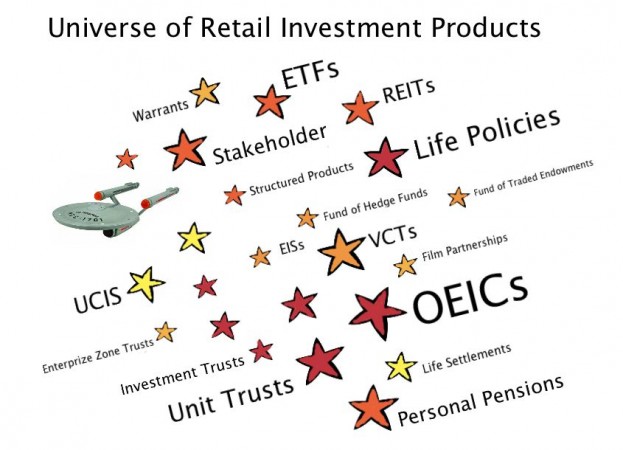Being an Independent Financial Adviser is a lot like being Captain James T. Kirk.
Space: the final frontier. These are the voyages of the starship Enterprise. Its five-year mission: to explore strange new worlds, to seek out new life and new civilizations, to boldly go where no man has gone before.
Since the beginning of this year, proving our Independence has become a difficult mission for us and for many other IFAs also. Of the 10 largest advice groups in the UK, nine have already given up and become Restricted Advisers, which sounds – well – Naff. Here’s a question; What would you like, Independent Advice or Restricted Advice? Doesn’t that sound like a loaded question? And yet with the best will in the world, we too may have to succumb at some point and describe our offering as Restricted also.
You see the Financial Services Authority has a very specific definition of Independence.
A firm must not hold itself out to a retail client as acting independently, unless the only personal recommendations in relation to retail investment products it offers to that retail client are:
(a) based on a comprehensive and fair analysis of the relevant market; and
(b) unbiased and unrestricted.
The “relevant market” part is proving to be the problem as it is very hard to prove you have considered everything that is relevant unless you have considered absolutely everything. “Did you consider investing this clients life savings into the latest Structured Kick-out product from Barclays?”
Like the starship Enterprise, we continually scour the known Investment Universe to offer our clients suitable investments from the whole of the market. We are unbiased and unrestricted. We can choose from anywhere. But often it is what we don’t recommend which offers the most value to our clients.
- We explore “strange new worlds” when we evaluate some Unregulated Collective Investment Schemes, many of which seem downright toxic.
- We “seek out new life” when we review the universe of Life Settlement Funds, which in truth have more to do with the undead than the living.
- We “encounter new civilisations” when we look at the complex world of Structured Products, and try to evaluate the ultimate counter-party risk. (don’t ask)
- Some charging structures we see are hidden better than a Klingon ship with it’s cloaking device deployed.
UCIS for example can be a difficult environment where both mankind and his money seldom flourish. Evaluating the latest often feels like another trip to a hostile planet. We know the outcome before we start. We will need to be beamed-up to the safety of the ship and the security guy we have never seen in any previous episode will die horribly. No thank you.
At the end of the day we prefer the more benign galaxies. We have the huge constellations of Unit Trusts, Open Ended Investment Contracts, Exchange Traded Funds and Real Estate Investment Trusts. All happy bountiful places where long term growth is the norm and hardly anyone dies. A trip to these planets usually results in some love interest for Captain Kirk and despite the planets being light years away all the aliens look like us and speak English. Yes please.
However, no matter how much more sensible it is for us and our clients to stay well clear of the likes of Arch Cru and Key Data to name just two recent fund failures, we have to demonstrate we regularly consider them.
And besides avoiding the devious, criminal and toxic wouldn’t make great telly.
Investment: the final frontier. These are the voyages of the company H.J.Scott & Co. Its twenty five-year mission: to explore comfortable known worlds, to seek out new growth and new dividends, to boldly avoid where more gullible advisers have gone before.
Captains log: Stardate 15022013 En-route to the FTSE250 to discover the 11 REITs who live there…
Fetch the remote, this episode sounds like its going to be boring.

